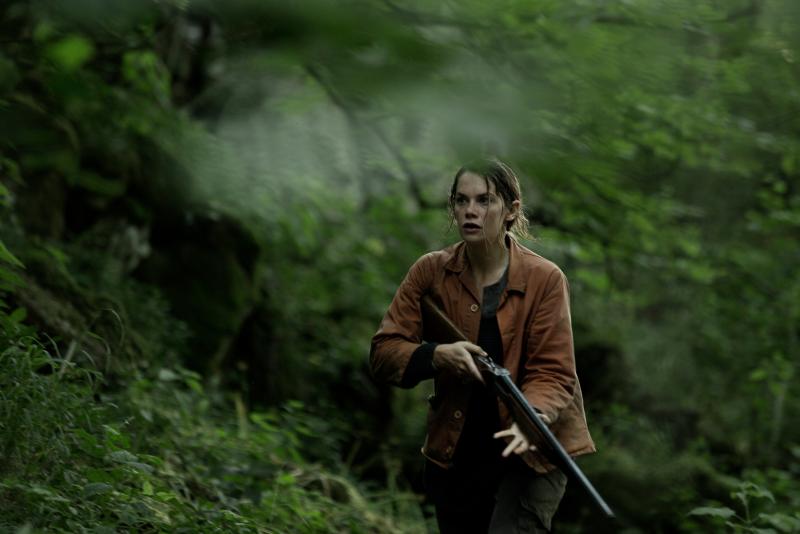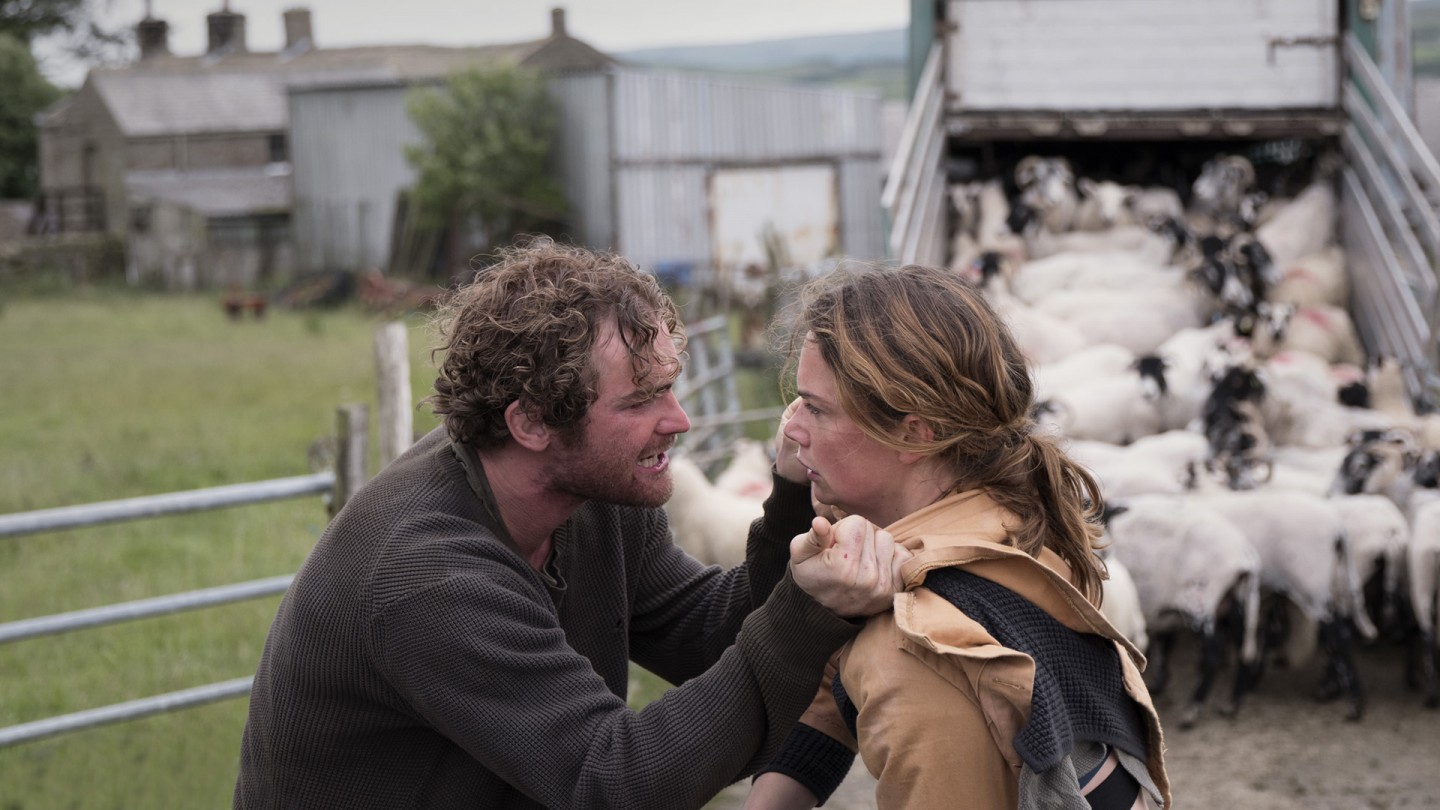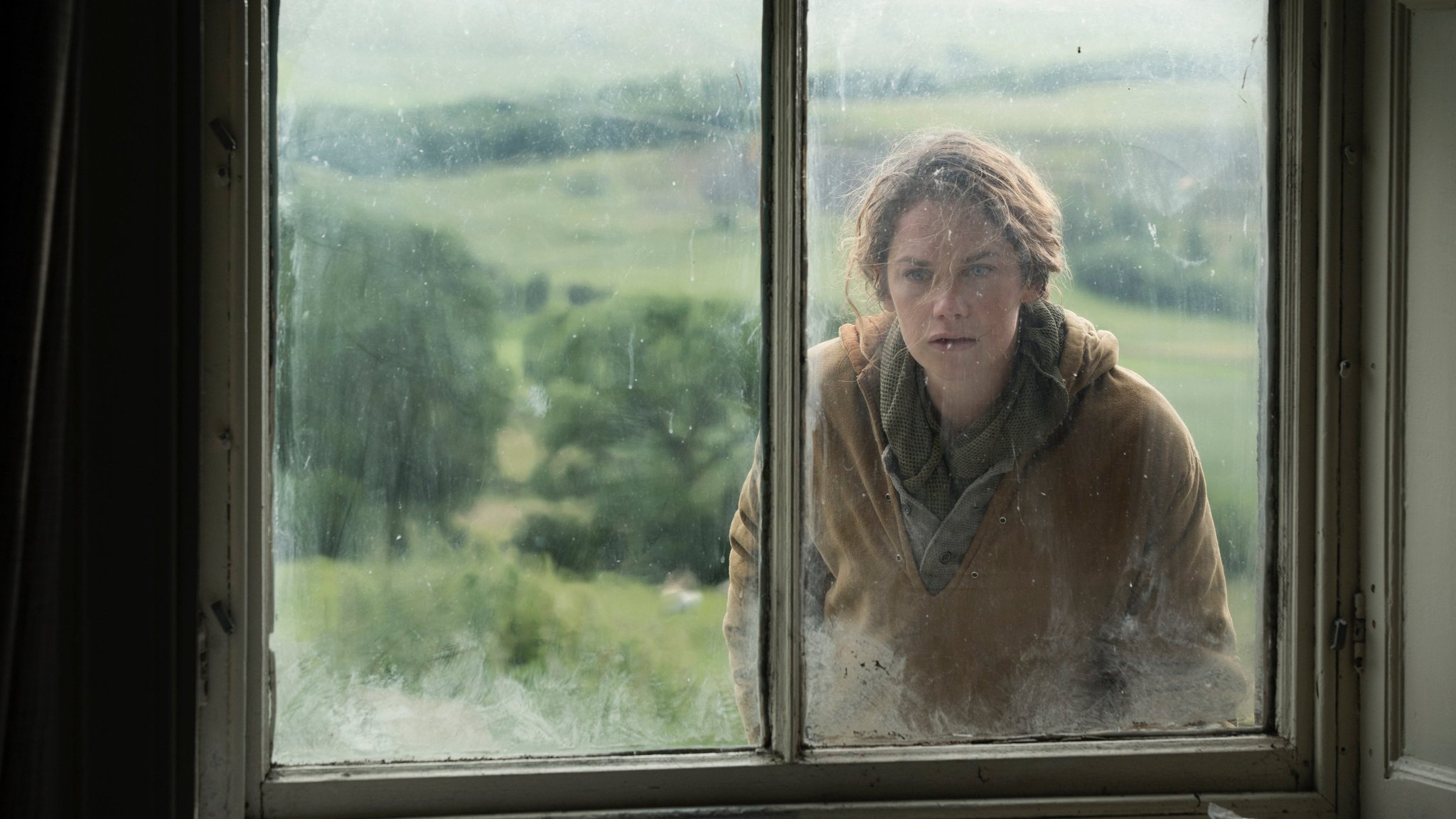Dark River review - haunted rural realism | reviews, news & interviews
Dark River review - haunted rural realism
Dark River review - haunted rural realism
Family secrets are dredged up in the Yorkshire moors

Country darkness falls quickly when Alice (Ruth Wilson) goes back to the farm. She stops before entering to gratefully absorb the Yorkshire countryside’s sunny beauty.
In Britain’s small but crucial new wave of realist rural films, it’s remarkable how much Dark River rhymes with last year’s The Levelling. Both involve daughters returning to failing farms where their fathers were weighed down with guilt. They’re almost silent films at times, in settings which, as Alec Secereanu’s itinerant worker observes in God’s Own Country, are “beautiful, but lonely”. Still, it’s the social context in which Alice’s trauma plays out which distinguishes Dark River, and Ruth Wilson’s performance. Though Alice is used to the physical rigours of sheep farming, being a rare female farmer in an environment where she was abused leaves her doubly braced for assault. A quick post-pub shag with a man she once fancied and her physical defence by an older male friend are rare moments of relief from professional insults, and Joe’s hair-trigger temper. The farm’s corporate freeholders, tempting the hopelessly over-his-head Joe to take on the tenancy and sell up, meanwhile suggest the wider battle which small tenant farmers who love their land have to endure.
Still, it’s the social context in which Alice’s trauma plays out which distinguishes Dark River, and Ruth Wilson’s performance. Though Alice is used to the physical rigours of sheep farming, being a rare female farmer in an environment where she was abused leaves her doubly braced for assault. A quick post-pub shag with a man she once fancied and her physical defence by an older male friend are rare moments of relief from professional insults, and Joe’s hair-trigger temper. The farm’s corporate freeholders, tempting the hopelessly over-his-head Joe to take on the tenancy and sell up, meanwhile suggest the wider battle which small tenant farmers who love their land have to endure.
This is Barnard’s third exploration of her native Yorkshire. It’s her furthest venture yet from the Bradford council estate edgeland of her semi-documentary investigation of playwright Andrea Dunbar, The Arbor, and as Alice wanders away from the farm to dip in a river, and later seems to sink into the land, ancient ceremonies and sacrifices are suggested. A folk song sung by fellow occasional sheep-farmer PJ Harvey adds to these hints of pre-industrial thoughts and deeds. Those climactic scenes also lurch into melodrama after the earlier simmering dread. They at least make clear that, just as Barnard’s The Selfish Giant was a platonic love story between two otherwise friendless young boys, so Dark River is about the love between sister and brother, brutalised by their father but finally redeemed.
Those climactic scenes also lurch into melodrama after the earlier simmering dread. They at least make clear that, just as Barnard’s The Selfish Giant was a platonic love story between two otherwise friendless young boys, so Dark River is about the love between sister and brother, brutalised by their father but finally redeemed.
For a former conceptual artist and documentarian, Barnard is strong on characterisation and narrative, as well as the social pressures and landscapes which shape lives. Like her previous films, Dark River also sees her taking the long view of a life. Alice’s abuse remains only as flashback shards breaking through from the past. Barnard is more concerned with this haunting’s survival and banishment.
rating
Explore topics
Share this article
The future of Arts Journalism
You can stop theartsdesk.com closing!
We urgently need financing to survive. Our fundraising drive has thus far raised £49,000 but we need to reach £100,000 or we will be forced to close. Please contribute here: https://gofund.me/c3f6033d
And if you can forward this information to anyone who might assist, we’d be grateful.

Subscribe to theartsdesk.com
Thank you for continuing to read our work on theartsdesk.com. For unlimited access to every article in its entirety, including our archive of more than 15,000 pieces, we're asking for £5 per month or £40 per year. We feel it's a very good deal, and hope you do too.
To take a subscription now simply click here.
And if you're looking for that extra gift for a friend or family member, why not treat them to a theartsdesk.com gift subscription?
more Film
 Can I get a Witness? review - time to die before you get old
Ann Marie Fleming directs Sandra Oh in dystopian fantasy that fails to ignite
Can I get a Witness? review - time to die before you get old
Ann Marie Fleming directs Sandra Oh in dystopian fantasy that fails to ignite
 Happyend review - the kids are never alright
In this futuristic blackboard jungle everything is a bit too manicured
Happyend review - the kids are never alright
In this futuristic blackboard jungle everything is a bit too manicured
 Robert Redford (1936-2025)
The star was more admired within the screen trade than by the critics
Robert Redford (1936-2025)
The star was more admired within the screen trade than by the critics
 Blu-ray: The Sons of Great Bear
DEFA's first 'Red Western': a revisionist take on colonial expansion
Blu-ray: The Sons of Great Bear
DEFA's first 'Red Western': a revisionist take on colonial expansion
 Spinal Tap II: The End Continues review - comedy rock band fails to revive past glories
Belated satirical sequel runs out of gas
Spinal Tap II: The End Continues review - comedy rock band fails to revive past glories
Belated satirical sequel runs out of gas
 Downton Abbey: The Grand Finale review - an attemptedly elegiac final chapter haunted by its past
Noel Coward is a welcome visitor to the insular world of the hit series
Downton Abbey: The Grand Finale review - an attemptedly elegiac final chapter haunted by its past
Noel Coward is a welcome visitor to the insular world of the hit series
 Islands review - sunshine noir serves an ace
Sam Riley is the holiday resort tennis pro in over his head
Islands review - sunshine noir serves an ace
Sam Riley is the holiday resort tennis pro in over his head
 theartsdesk Q&A: actor Sam Riley on playing a washed-up loner in the thriller 'Islands'
The actor discusses his love of self-destructive characters and the problem with fame
theartsdesk Q&A: actor Sam Riley on playing a washed-up loner in the thriller 'Islands'
The actor discusses his love of self-destructive characters and the problem with fame
 Honey Don’t! review - film noir in the bright sun
A Coen brother with a blood-simple gumshoe caper
Honey Don’t! review - film noir in the bright sun
A Coen brother with a blood-simple gumshoe caper
 The Courageous review - Ophélia Kolb excels as a single mother on the edge
Jasmin Gordon's directorial debut features strong performances but leaves too much unexplained
The Courageous review - Ophélia Kolb excels as a single mother on the edge
Jasmin Gordon's directorial debut features strong performances but leaves too much unexplained
 Blu-ray: The Graduate
Post #MeToo, can Mike Nichols' second feature still lay claim to Classic Film status?
Blu-ray: The Graduate
Post #MeToo, can Mike Nichols' second feature still lay claim to Classic Film status?

Add comment